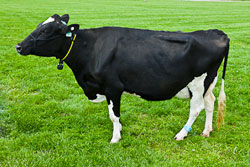Dairy cows on a University of Kentucky research farm have been accessorized with tags to measure everything from health to behavior in a new study to advance precision dairy farming.
 A research and extension team led by dairy systems management extension specialist Jeffrey Bewley, University of Kentucky College of Agriculture Department of Animal and Food Sciences, is embarking on the two-year study at the UK Coldstream Dairy Research Farm.
A research and extension team led by dairy systems management extension specialist Jeffrey Bewley, University of Kentucky College of Agriculture Department of Animal and Food Sciences, is embarking on the two-year study at the UK Coldstream Dairy Research Farm.
Using several different technologies, the team will gather biological and observational data that indicate health status and estrus behavior. Detection of heat stress, the onset of calving, lameness, and early detection of mastitis, metritis, and metabolic disorders are also areas of interest.
A milking system will measure drops in yield in each quarter of the cow’s udder, and in particular, electrical conductivity of the milk at the quarter level during milking. There is an indirect connection between electrical conductivity and mastitis. Tags will measure rumination, or cud chewing, providing an opportunity to react quickly to, say, onset of illness or disadvantageous feeding changes, at the single-animal and herd level. A second set of tags will take the surface temperature of the inside of the right ear of each fresh cow every five minutes. Another technology will monitor lying behavior and activity. And a passive bolus system will monitor animal core temperature, which provides information for early disease detection, ovulation detection and parturition. Finally, an eartag will monitor ear temperature and activity to identify potential peripheral shock (cold extremities), which may be particularly useful for early identification of milk fever.
Combined, these devices will provide data that measures cow comfort, which can then be extrapolated to make changes in the dairy’s facilities. Cow comfort can lead to better overall health, which lowers the cost of animal care and/or treatment and can increase animal longevity and boost milk yield.
